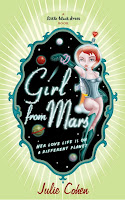There’s much excitement over at Salon.com with Laura Miller’s Readers’ Advice to Writers, which has generated both cries of Philistinism! and Yes, my reading life is justified. Ms. Miller, by the way, is qualified to give advice as a reader, not a writer.
I don’t have time to wade through over one hundred responses, but there’s one statement from Ms. Miller that resonated with me:
Desire is the engine that drives both life and narrative.
While other pieces of advice, for instance, Remember that nobody agrees on what a beautiful prose style is and most readers either can’t recognize “good writing” or don’t value it that much, I absolutely disagree with. I don’t want to read anything that shouts beautiful prose style but if it strikes me as beautiful that’s an added bonus (and may keep me reading). And even if a reader doesn’t acknowledge or care about style, clunky prose may well give them that odd, seasick feeling that makes them close the book without really knowing why they couldn’t keep going. Shouldn’t good writing be something that flows and that you don’t really notice because it is so appropriate to the narrative?
Ms. Miller’s article was inspired by the Guardian’s two-part Ten Rules for Writing Fiction which was actually much more interesting from my point of view and I haven’t read all of it, but I did pick up a few gems that I wanted to share. The article was prompted by the releases next month of Elmore Leonard’s book of the same name and his ten basic rules begin the article.
I went first to the writers I liked and then browsed around. I had a grudging admiration for Philip Pullman‘s contribution:
My main rule is to say no to things like this, which tempt me away from my proper work.
Okay, Mr. Pullman. Moving on. Nearly everyone agreed a writer should read:
Read like mad. But try to do it analytically – which can be hard, because the better and more compelling a novel is, the less conscious you will be of its devices. It’s worth trying to figure those devices out, however: they might come in useful in your own work. Hilary Mantel
When still a child, make sure you read a lot of books. Spend more time doing this than anything else. Zadie Smith
Except for Will Self, who claims it’s too late:
Stop reading fiction – it’s all lies anyway, and it doesn’t have anything to tell you that you don’t know already (assuming, that is, you’ve read a great deal of fiction in the past; if you haven’t you have no business whatsoever being a writer of fiction).
Zadie Smith gives this cogent piece of advice (yes! yes!)
Work on a computer that is disconnected from the internet.
And then mentions that Jean Plaidy used to write five thousand words before lunchtime and spend the afternoon writing fan letters. Just thinking about it makes me want to lie down.
I loved these gems from Roddy Doyle:
Do keep a thesaurus, but in the shed at the back of the garden or behind the fridge, somewhere that demands travel or effort. Chances are the words that come into your head will do fine, eg “horse”, “ran”, “said”.
Do, occasionally, give in to temptation. Wash the kitchen floor, hang out the washing. It’s research.
And again from Zadie Smith:
Don’t panic. Midway through writing a novel, I have regularly experienced moments of bowel-curdling terror, as I contemplate the drivel on the screen before me and see beyond it, in quick succession, the derisive reviews, the friends’ embarrassment, the failing career, the dwindling income, the repossessed house, the divorce . . . Working doggedly on through crises like these, however, has always got me there in the end. Leaving the desk for a while can help. Talking the problem through can help me recall what I was trying to achieve before I got stuck. Going for a long walk almost always gets me thinking about my manuscript in a slightly new way. And if all else fails, there’s prayer. St Francis de Sales, the patron saint of writers, has often helped me out in a crisis. If you want to spread your net more widely, you could try appealing to Calliope, the muse of epic poetry, too.
Have you read either of these articles? What did you think?
If you’re a writer, what’s the most valuable piece of advice you were ever given?
And as a reader, what advice would you give writers?
 Guest blogging and giving away a copy of Improper Relations (later) today at Lust In Time, and tomorrow I’m a guest at Victoria Janssen‘s blog. And don’t forget my contest.
Guest blogging and giving away a copy of Improper Relations (later) today at Lust In Time, and tomorrow I’m a guest at Victoria Janssen‘s blog. And don’t forget my contest.





